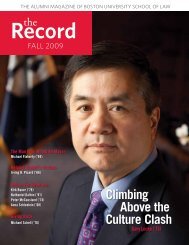the nature of representation: the cherokee right ... - Boston University
the nature of representation: the cherokee right ... - Boston University
the nature of representation: the cherokee right ... - Boston University
Create successful ePaper yourself
Turn your PDF publications into a flip-book with our unique Google optimized e-Paper software.
2005] THE NATURE OF REPRESENTATION 141<br />
<strong>representation</strong>. 257 As a relatively larger and more powerful tribe, <strong>the</strong> Cherokees felt<br />
that a Pan-Indian territorial government would, according to a Cherokee Memorial<br />
<strong>of</strong> Jan. 24, 1866, “crush us as a people, and destroy us as a nation.” 258<br />
It is<br />
impossible to generalize regarding <strong>the</strong> <strong>nature</strong> <strong>of</strong> Indian tribes. “The sheer number<br />
<strong>of</strong> tribes—well over 500 by any count—invites chaos,” especially for <strong>the</strong> interests<br />
<strong>of</strong> particular tribes. 259 The number and diversity <strong>of</strong> tribes makes unified action<br />
difficult because <strong>of</strong> <strong>the</strong> standard enemies <strong>of</strong> large groups: free-riders and hold-outs.<br />
Consequently, even a proposal for a Pan-Indian delegate would get bogged down in<br />
inter-tribal conflict.<br />
The <strong>representation</strong>al challenges faced by a Cherokee and a Pan-Indian delegate are<br />
distinct, but nei<strong>the</strong>r delegate type would be immune from internal Indian criticism<br />
and nei<strong>the</strong>r proposal would necessarily be an easier sale within <strong>the</strong> Indian<br />
community. Ra<strong>the</strong>r than dooming <strong>the</strong> push for a solely Cherokee delegate, this<br />
observation cautions against seeking political solutions that disregard <strong>the</strong> specific<br />
<strong>nature</strong> <strong>of</strong> <strong>the</strong> Cherokee <strong>right</strong> to deal with Indian opposition. The Cherokee Nation<br />
might be able to head <strong>of</strong>f some non-Cherokee opposition to <strong>the</strong> Cherokee Nation’s<br />
unique <strong>representation</strong>. A clear and careful proclamation that <strong>the</strong> delegate does not<br />
speak for non-Cherokee Indians but ra<strong>the</strong>r, only for Cherokees, could limit<br />
challenges by non-Cherokee tribes.<br />
3. Downside Risks <strong>of</strong> Pursuing a Delegate Form <strong>of</strong> Representation<br />
The most important <strong>representation</strong>al issue raised by <strong>the</strong> Cherokee delegate <strong>right</strong><br />
is whe<strong>the</strong>r <strong>the</strong> benefits <strong>of</strong> Congressional <strong>representation</strong> for <strong>the</strong> Cherokees outweigh<br />
<strong>the</strong> costs. Indian sovereignty and nationhood arguably require a degree <strong>of</strong><br />
separation and independence from <strong>the</strong> U.S. government that would be destroyed by<br />
direct incorporation <strong>of</strong> a Cherokee, politically defined representative in <strong>the</strong> U.S.<br />
House <strong>of</strong> Representatives. The act <strong>of</strong> calling for a Cherokee delegate, if done by <strong>the</strong><br />
Cherokee Nation, would signal to U.S. <strong>of</strong>ficials that <strong>the</strong> Cherokees wanted to be<br />
more, not less, involved in <strong>the</strong> U.S. government. Therefore, Cherokee leaders<br />
must fully consider all implications, including negative ones, <strong>of</strong> <strong>the</strong> delegate <strong>right</strong><br />
before pushing for recognition <strong>of</strong> this <strong>right</strong>.<br />
Given <strong>the</strong> general indifference <strong>of</strong> <strong>the</strong> U.S. government to Indian tribes, <strong>the</strong> <strong>right</strong><br />
to a Congressional delegate seems inherently preferable to <strong>the</strong> currently curtailed<br />
ability <strong>of</strong> <strong>the</strong> Cherokee Nation to participate in legislation affecting <strong>the</strong> Cherokees,<br />
let alone in general U.S. legislation. The limitations <strong>of</strong> <strong>the</strong> Cherokee Nation’s<br />
current Washington, D.C. <strong>of</strong>fice can be contrasted with <strong>the</strong> power <strong>of</strong> Congressional<br />
delegates: ra<strong>the</strong>r than being constrained to <strong>the</strong> mere lobbying <strong>of</strong> lawmakers,<br />
Cherokees in D.C. could be lawmakers. But <strong>the</strong> price <strong>of</strong> having a key to Congress<br />
might be a loss <strong>of</strong> tribal sovereignty. Tribes that have chosen or been forced to<br />
257<br />
SATZ, supra note 85, at 219.<br />
258<br />
Lambert, supra note 222, at 475.<br />
259<br />
CHARLES F. WILKINSON,AMERICAN INDIANS,TIME, AND THE LAW: NATIVE SOCIETIES IN<br />
A MODERN CONSTITUTIONAL DEMOCRACY 7 (1987).









